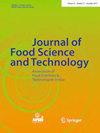Osmotic Dehydration and Assessment of Quality Attributes of Seasonal Vegetable Crops: Carrot and Beetroot Cubes
IF 3.3
3区 农林科学
Q2 FOOD SCIENCE & TECHNOLOGY
引用次数: 0
Abstract
Fulfilling the food demand of a growing population is the biggest challenge as lot of food globally got wasted due to improper storage and processing. Osmotic dehydration offers high-quality preservation and maintenance of the integrity of fruits & vegetables. Response surface methodology was performed to estimate the main effect of osmotic dehydration process on quality attributes of carrot and beetroot cubes. Higher values of the osmotic solution of salt and sucrose at sample to solution ratio of 1:5 had provoked higher flows of water and solutes through the carrot and beetroot cubes. The range of NaCl concentration varies from 4-12 % w/v in carrot and 12-16 % w/v in beetroot for 2, 4 and 6 hour. However, sucrose concentration varies from 40-60o Brix in both carrot and beetroot. Quality attribute of carrot and beetroot including ascorbic acid, carotenoid, total phenol etc. didn’t changed on recommended process variables 50o Brix of sucrose + 8 % w/v sodium chloride for carrot and 50o Brix of sucrose + 14 % w/v NaCl for beetroot under osmotic dehydration for 4 hours. It was considered to get maximum water loss, weight reduction, subsequent rehydration ratio, overall acceptability and minimum solute gain of rehydrated product.季节性蔬菜作物胡萝卜和甜菜块的渗透脱水及品质特性评价
满足不断增长的人口对食物的需求是最大的挑战,因为全球有许多食物由于储存和加工不当而被浪费。渗透脱水提供了高质量的保存和维护水果和蔬菜的完整性。采用响应面法评价渗透脱水过程对胡萝卜和甜菜块茎品质属性的主要影响。较高的盐和蔗糖的渗透溶液在样品与溶液的比例为1:5时,会引起胡萝卜和甜菜根立方体中较高的水和溶质流量。NaCl浓度在胡萝卜中为4 ~ 12% w/v,在甜菜根中为12 ~ 16% w/v,处理时间分别为2、4、6 h。然而,胡萝卜和甜菜根中的蔗糖浓度在40- 60brix之间变化。胡萝卜和甜菜根的品质指标(抗坏血酸、类胡萝卜素、总酚等)在推荐的工艺参数(500白利度蔗糖+ 8% w/v氯化钠)和500白利度蔗糖+ 14% w/v NaCl渗透脱水4小时)下均无变化。以最大失水、减重、后续复水化率、总体可接受度和最小溶质增益为目标。
本文章由计算机程序翻译,如有差异,请以英文原文为准。
求助全文
约1分钟内获得全文
求助全文
来源期刊
CiteScore
7.70
自引率
0.00%
发文量
274
审稿时长
11 months
期刊介绍:
The Journal of Food Science and Technology (JFST) is the official publication of the Association of Food Scientists and Technologists of India (AFSTI). This monthly publishes peer-reviewed research papers and reviews in all branches of science, technology, packaging and engineering of foods and food products. Special emphasis is given to fundamental and applied research findings that have potential for enhancing product quality, extend shelf life of fresh and processed food products and improve process efficiency. Critical reviews on new perspectives in food handling and processing, innovative and emerging technologies and trends and future research in food products and food industry byproducts are also welcome. The journal also publishes book reviews relevant to all aspects of food science, technology and engineering.

 求助内容:
求助内容: 应助结果提醒方式:
应助结果提醒方式:


